Dear Zazie, Here is today’s Lovers’ Chronicle from Mac Tag. Has someone spread their dreams and words at your feet? Have you spread your dreams and words at someone’s feet? Rhett
The Lovers’ Chronicle
Dear Muse,
© copyright 2020 mac tag/cowboy coleridge all rights reserved
desire
i have this
this vision
and this way
of bein’ alone
cannot wish nor will
for anything else,
this dream
no more pretendin’
of what was felt
of the inescapable
of what is essential
now, clear
in thinkin’,
and feelin’
to tread not softly
but boldly forward
© copyright 2018 mac tag/cowboy coleridge all rights reserved
Tread Softly
Here is a poem for William Butler Yeats, Maud Gonne and you. I spread my dreams and words at your feet, so please ……
Had I silver and gold, rubies and pearls,
Wrapped up in pretty paper and ribbons,
And everything in the world that was good
Of time and truth and of heaven and hope,
I would give it all to see you again:
But I have only my dreams and my words;
So I spread my dreams and words on the wind;
And pray that darkness treads softly on them
© 2013 Cowboy Coleridge All rights reserved
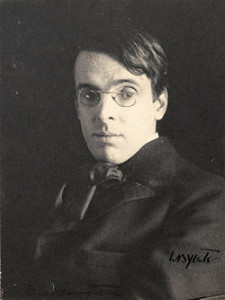 Today is the birthday of one of my favorite poets, William Butler Yeats, born in Sandymount, County Dublin, Ireland (1865). He lived during great political and social changes in his home country, but he spent much of his life obsessed not with politics but with mysticism.
Today is the birthday of one of my favorite poets, William Butler Yeats, born in Sandymount, County Dublin, Ireland (1865). He lived during great political and social changes in his home country, but he spent much of his life obsessed not with politics but with mysticism.
He got involved in the London Theosophical Society in 1887 and later joined the Order of the Golden Dawn, a group that performed a variety of ancient magic rituals. He attended séances and tarot card readings. Seeing the performances of mediums and learning about reincarnation inspired him to study Celtic myths and folklore.
In 1889, he met Maud Gonne, a beautiful actress who had become an activist and who spoke out for Irish independence. She became the love of his life, and though she refused his proposal of marriage, she believed that they were spiritually married, that they could communicate telepathically, and that they had been brother and sister in a past life. She helped him gather folklore from the peasants, and to learn about ancient Celtic culture. Yeats came to believe that if he could get in touch with the deep, mythic history of the Irish people, he could pull the country together with the power of poetry. Yeats spent years writing plays about Irish nationalism for Gonne to star in.
Many of Yeats’s poems are inspired by her, or mention her. He wrote the plays The Countess Cathleen and Cathleen Ní Houlihan for her. His poem Aedh wishes for the Cloths of Heaven ends with a reference to her:
I have spread my dreams under your feet;
Tread softly because you tread on my dreams.
Few poets have celebrated a woman’s beauty to the extent Yeats did in his lyric verse about Gonne. From his second book to Last Poems, she became the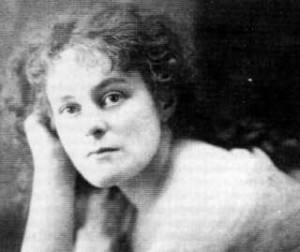 Rose, Helen of Troy (in No second Troy), the Ledaean Body (Leda and the Swan and Among School Children), Cathleen Ní Houlihan, Pallas Athene and Deirdre. Gonne turned down several proposals from Yeats before marrying John McBride with whom she would have a son, Seán MacBride. She and MacBride would separate in 1904. Gonne and Yeats finally consummated their relationship in Paris in 1908. Yeats’ long years of fidelity, so to speak, were rewarded at last, although Yeats would later remark that “the tragedy of sexual intercourse is the perpetual virginity of the soul.” The relationship did not develop into a new phase after their night together. Soon afterwards, Gonne wrote to the poet indicating that despite the physical consummation, they could not continue as they had been: “I have prayed so hard to have all earthly desire taken from my love for you and dearest, loving you as I do, I have prayed and I am praying still that the bodily desire for me may be taken from you too.” By January 1909, Gonne was sending Yeats letters praising the advantage given to artists who abstain from sex. Nearly twenty years later, Yeats recalled the night with Gonne in his poem “A Man Young and Old”:
Rose, Helen of Troy (in No second Troy), the Ledaean Body (Leda and the Swan and Among School Children), Cathleen Ní Houlihan, Pallas Athene and Deirdre. Gonne turned down several proposals from Yeats before marrying John McBride with whom she would have a son, Seán MacBride. She and MacBride would separate in 1904. Gonne and Yeats finally consummated their relationship in Paris in 1908. Yeats’ long years of fidelity, so to speak, were rewarded at last, although Yeats would later remark that “the tragedy of sexual intercourse is the perpetual virginity of the soul.” The relationship did not develop into a new phase after their night together. Soon afterwards, Gonne wrote to the poet indicating that despite the physical consummation, they could not continue as they had been: “I have prayed so hard to have all earthly desire taken from my love for you and dearest, loving you as I do, I have prayed and I am praying still that the bodily desire for me may be taken from you too.” By January 1909, Gonne was sending Yeats letters praising the advantage given to artists who abstain from sex. Nearly twenty years later, Yeats recalled the night with Gonne in his poem “A Man Young and Old”:
My arms are like the twisted thorn
And yet there beauty lay;
The first of all the tribe lay there
And did such pleasure take;
She who had brought great Hector down
And put all Troy to wreck.
I never tire of tellin’ that story. So he had a muse and a great unrequited love. And then to have consummated that love at long last; in Paris! How could life be any better! And then to lose her! How could life be more bitter! How well I know the better and the bitter. If Gonne was correct about the advantage given to artists who abstain from sex, then I can look forward to a writing windfall.
I dream of the soft look
Your eyes had once, and of their shadows deep. – WB Yeats
Hmmm, given up on tryin’ to win someone’s love. Somethin’ we know a lot about her at TLC.
The Song of the Day is “Tread Softly” by Gráda. We do not own the rights to this song. All rights reserved by the rightful owner
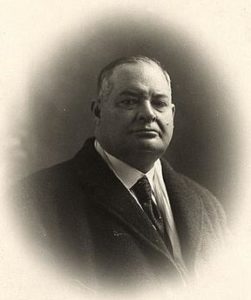 Today is the birthday of Joseph Stella (born Giuseppe Michele Stella in Muro Lucano June 13, 1877 – November 5, 1946 New York); Futurist painter best known for his depictions of industrial America, especially his images of the Brooklyn Bridge. He is also associated with the American Precisionist movement of the 1910s–1940s.
Today is the birthday of Joseph Stella (born Giuseppe Michele Stella in Muro Lucano June 13, 1877 – November 5, 1946 New York); Futurist painter best known for his depictions of industrial America, especially his images of the Brooklyn Bridge. He is also associated with the American Precisionist movement of the 1910s–1940s.
Stella returned to Italy in 1909. He was unhappy with America, writing that he longed to be back in his native land after “an enforced stay among enemies, in a black funereal land over which weighed … the curse of a merciless climate.” By 1911, he had departed Italy, where the omnipresence of the Renaissance presented its own kind of obstacle for contemporary painters, and relocated to Paris. When he arrived, “Fauvism, Cubism, and Futurism were in full swing,” he wrote, and “[there] was in the air the glamor of a battle.” It was the right place to be, at just the right time, for a man of Stella’s curiosity, openness to new trends, and ambition.
In Paris, Stella attended the salon of Gertrude Stein, where he met many other painters. “[Stein] found the big and boisterous painter rather like [her friend, the poet] Apollinaire; they both had a fund of sarcastic wit that was frequently turned on their hosts.” Stella’s view of his hostess was indeed sarcastic: she sat, he wrote, “enthroned on a sofa in the middle of the room,” surrounded by her Cézannes and Picassos, “with the forceful solemnity of a pythoness or a sibyl … in a high and distant pose.”



Leon Chwistek
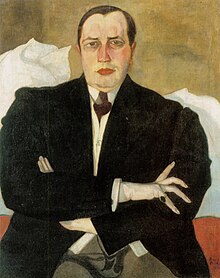
Today is the birthday of Leon Chwistek (Kraków, Austria-Hungary, 13 June 1884 – 20 August 1944, Barvikha near Moscow, Russia); avant-garde painter, theoretician of modern art, literary critic, logician, philosopher and mathematician.
Gallery
-

Fencing 1919
-

Portrait Tytus Czyżewski 1920
-

Feast 1925
-
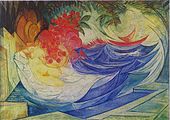
Venus 1928
-

Nude 1939
Verse
Não tenho ambições nem desejos
Ser poeta não é uma ambição minha
É a minha maneira de estar sozinho.
- I have no ambitions nor desires.
To be a poet is not my ambition,
It’s simply my way of being alone. - Alberto Caeiro (heteronym), O Guardador de Rebanhos (“The Keeper of Herds”, tr. Richard Zenith) in Athena, January 1925.
- Não sou nada.
Nunca serei nada.
Não posso querer ser nada.
À parte isso, tenho em mim todos os sonhos do mundo.- I am nothing.
I shall never be anything.
I cannot even wish to be anything.
Apart from this, I have within me all the dreams of the world. - Álvaro de Campos (heteronym), Tabacaria (“The Tobacconist’s” or “The Tobacco Shop”), January 15, 1928.
- Variant translation:
- I am nothing.
Never shall be anything.
Cannot will to be anything.
This apart, I have in me all the dreams of the world.
- I am nothing.
- I am nothing.
- A metafísica é uma consequência de estar mal disposto.
- Metaphysics is a consequence of being indisposed.
- Tabacaria (1928)

- O poeta é um fingidor.
Finge tão completamente
Que chega a fingir que é dor
A dor que deveras sente.- The poet is a pretender.
He pretends so completely,
that he even pretends that it is pain
the pain he really feels. - “Autopsicografia”, in Presença, No. 36 (November 1932)
- Richard Zenith’s translation:
- The poet is a faker
Who’s so good at his act
He even fakes the pain
Of pain he feels in fact.
- The poet is a faker
- Richard Zenith’s translation:
- The poet is a pretender.
- O amor é que é essencial.
O sexo é só um acidente.- It’s love that is inescapable.
Sex is the merest accident. - Poem (5 April 1935), reported in Poesias inéditas (1930-1935), p. 192.
- Variant translation:
- Love is essential. Sex, a mere accident.
- It’s love that is inescapable.
Clear in thinking, and clear in feeling,
and clear in wanting
- Original: Claro em pensar, e claro no sentir,
e claro no querer - Poem “D. Pedro”, verses 1-2
Without madness what is man
more than the healthy beast,
corpse adjourned that procreates?
- Original: Sem a loucura que é o homem
Mais que a besta sadia,
Cadáver adiado que procria? - Poem “D. Sebastião”, verses 8-10
Mac Tag
Follow us on twitter @cowboycoleridge

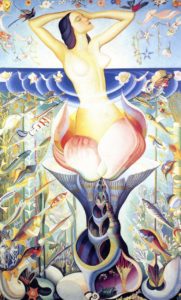
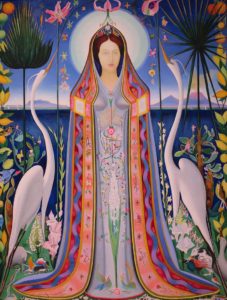
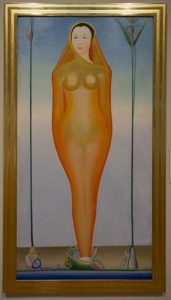
One Comment on "The Lovers’ Chronicle 13 June – treadin’ – verse by W. B. Yeats & Fernando Pessoa – art by Joseph Stella & Leon Chwistek"
Trackbacks
[...] by W. B. Yeats and one of my favorite movies, The Remains of the Day based on the novel of the same…